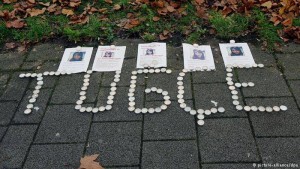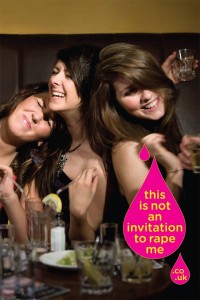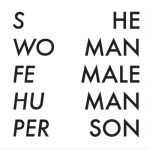Three countries, three examples of gender-based violence in Europe. How we react to it as a society and how we can change in dealing with this imminent issue in a sustainable and respectful way.
Saturday, November 15th, Offenbach
Tuğçe A., 22 years old, studying to become a teacher, lives in Offenbach, Germany. In the evening, she goes out with a group of girlfriends, they end up at McDonald’s, as many nights end. There, she witnesses a harassment in the bathroom. Three young men are harassing two women. Tugce walks in on them and tries to help, managing to get them kicked out of the fast food restaurant. But the night ends deadly for her. Outside, in the parking lot, the situation quickly turns into a fight. She is brought to the ground by one of offenders and dies in the following days, due to her head injury.
A whole country mourns Tuğçe’s death. Again, the news spreads from the Rhein-Main region, the area around Offenbach, to Germany and then to the world, mostly through feminist networks. She, a young German woman with Turkish heritage, was killed because of her courage, because she was unafraid to help. This is a quite particular case for Germany, which, unlike many other countries and cities, where cases of such brutality make big news.
A whole country is debating what steps to take. Should we have a stricter legislation on rape? Should we invest in more effective prosecution? Should we teach the staff of fast food restaurants to step in? Should we teach men not to harm women?
Saturday, November 22th, Pécs
A video appears on the Internet. It quickly makes the round of Facebook news feeds. First in Hungary, then many people with connections to Hungary see it and finally many more around the world. I am talking about this video, produced by the police of the county of Baranya, in southern Hungary, with the aim of preventing gender-based violence.
This issue is of particular concern to the people of Baranya and the police, seen as the responsible entity of prevention. Last year alone, there were several prominent cases of rape in the city of Pécs, which were taken up by media and contributed to a scare in the region and the whole country. The police therefore took initiative, a justified move, but it proved to be too fast of an action.
There a three different videos with a similar message: All of them feature young women going out at night, having fun, in short skirts and high heels nonetheless. After a couple rounds of shots, and some more skin-close dancing, they leave – and one of them is left on her own, in a presumably dangerous situation. In the dark, the viewer sees a hooded figure, who is taking a good look at her – we are left to imagine the rest. The video ends with a simple message: you are responsible, you can do something against it.
Wednesday, December 17th, Granada
We are sitting in the living room, my housemates and I and about 8 friends. Two of them are men, the rest women. The party has been going on for a good hour or two, the food has been eaten, wine has been drunk. The conversation is going well, and everyone is partaking. The topic: sexual harassment. The topic is not named this explicitly, but the women in the circle started sharing their stories about times when they felt aggressed in public or private for the simple reason of their gender, looks and moves.
“He took tons of videos of me dancing”, says my friend, recounting an anecdote of the salsa class she teaches. “And he got my number, you know I talked to him, I danced with him. He kept sending me messages on What’s app the next day. Like 18 messages, although I didn’t even reply to one. Like “Let’s study together”, “I can come to your university”, “I know this really good study method”. And all this without me replying to any of his messages, they just kept coming. That guy is crazy, I’m telling you. And he has at least 3-4 videos of me dancing on his phone.” We all shake our heads. “After a while I told him to leave me alone, not take any videos of me anymore, or talk to me, and that I wouldn’t dance with him anymore,” she said decisively. Well, you’re lucky, he didn’t get aggressive towards you, we say. He sounds like a person who would show up at your door with a knife, somebody adds.
“Well, I lived down this big street”, my other friend chimes in. “One night I came home, and this guy kept following me, like close by, and I got scared. I saw another man and told him about it. He agreed to walk with me, but then had to turn off the street before me. Then I ran home really fast. Fortunately the guy wasn’t there anymore.”
These anecdotes sound all too familiar to me. Situations, where friends were in very uncomfortable situation, being talked at at a bar or could barely escape to the door of their house, before someone got there, who seemed aggressive, dangerous. Situations, where I myself almost fell off my bike, after hearing what a passenger shouted at me. Things that left me with a sick feeling in my stomach for a couple of days, and still scare me, as I think back over them.
Here are three situations. Two of them made world news, just in time for the international campaign of 16DaysOfActivism against Gender-based violence, reminding us how important this issue still is, around the world. The third one is a local, everyday situation. One, where women share their stories about how they have been harassed and made uncomfortable. A situation that I lived this week, and that I have experienced many times before.
The third story is there to show us, how we can recognize how often people we know experience forms of gender-based violence in out own environment. How, in many different shades, whether verbal violence, stalking, threats and physical violence, it is exerted on a daily basis, everywhere. It is exerted against women and men, but more prominently against women. It is called gender-based violence, because it threatens someone because of their gender or because of their non-conformation to it. It is a form of discrimination that is structurally embedded and reproduced by our society.
It reminded me again of the very presence that this issue has in every woman’s life.
It reminded me, how closely this issue links the personal to the political. Fortunately, as in the case of Tuğçe, the state is taking a stand on it, is taking this case on as a matter of social responsibility in some places. Unfortunately, as in the case of the Baranya police video, in many places the state is still blaming women for aggressions they face, is giving them the responsibility and and demands them to personally protect themselves from crimes which are not their fault.
Három ország, három európai példa a nemi erőszakra. Három mese, amely mutatja, hogyan reagálunk erre társadalmi szinten és hogyan tudunk változni a reakción, hogy tisztelettel bánjunk ezzel a témával.
November 15., szombat, Offenbach (Németország)
Tuğçe A. 22 éves, tanárképzőre jár és a németországi Offenbachban él. Ezen az estén bulizni megy a barátnőivel, és az este végén a McDonaldsban végeznek, ahogy ez elő szokott fordulni. A vécében meglátja, ahogy három fiatalember két nöt zaklat. Tuğçe beavatkozik, segíteni próbál és sikeres: a zaklatókat kidobják a gyorsétteremből. Ahogy azonban a barátnőivel ő is elhagyja az éttermet, újra találkozik a férfiakkal.
Kint a parkolóban a szituáció gyorsan verekedéssé fokozódik. Az egyik támadó földre löki Tuğçe-t, aki pár nap múlva belehal a fejsérülésébe. Egy egész ország gyászolja Tuğçe-t. A hír először az Offenbach körüli Rhein-Main térséget járja be, aztán Németországot és a világot. Elöször a feminista csatornákon, aztán a nagyobb médiacsatornák is beszámoltak a tettröl. Németország sokkos állapotban van: itt ilyen brutális esetek nagy hírnek számitanak, mert szerencsére nem fordulnak elö gyakran.
Egy egész ország vitatja, hogy mi legyen a következö lépés. Tuğçe-t, a fiatal török származásu német nöt a bátorsága miatt ölték meg, mert nem félt segíteni. Mit csináljunk? – vitatja Németország. Szigorubban kellene fellépni a nemi eröszak ellen? Hatékonyabb eljárás a bünözők ellen? Tanítsuk meg a gyorsétterem dolgozóit, hogyan avatkozzanak közbe? Tanítsuk meg a férfiakat arra, hogy ne bántsák a nöket?
November 22., szombat, Pécs
Az interneten megjelenik egy videó és gyorsan bejárja a Facebookot. Elöször Magyarországon osztják meg, aztán az egész világon. Arról a videóról beszélek, amelyet a Baranya megyei rendörség készített, azzal a céllal hogy megelőzzék a nemi erőszakot.
Baranyában különös gondot jelent a téma és a rendörség az elismert bünmegelőzési hatalom. Több híres nemi eröszak eset történt Pécsett 2013- ban . Ezekröl beszámolt a média és ezzel hozzájárult a félelemhez amely a megyében és az egész országban elterjedt. Ezért jogosan cselekedett a rendörség, de úgy látszik túl meggondolatlanul.
A rendőrség úgy döntött hogy három videóval fogja felhívni a figyelmet a veszélyre, hasonló üzenetekkel: fiatal nöket látni bennük, ahogy este bulizni mennek, jól mulatnak, miniszoknyában és magassarkú cipöben. Egy pár rövidital, és több szoros tánc után, elindulnak haza – de egyikük egyedül marad egy veszélyesnek tűnő helyzetben. A sötétben egy kapucnis figurát látunk, aki nagyon figyeli a nőt – a többit a nézők képzeletére hagyják. A videó egy egyszerű üzenettel végződik: “Tehetsz róla, tehetsz ellene”.
December 17., szerda, Granada (Spanyolország)
A nagyszobában ülünk, a lakótársaim, kb. 8 haver és én. Kettő férfi, a többi nő. A buli már egy-két órája tart, esznek, isznak. Jól megy a beszélgetés és mindenki részt vesz. A téma: a szexuális zaklatás. Ezt nem mondjuk ki határozottan, de a nök elkezdik mesélni hogy mikor éltek át zaklatást otthon vagy kint, a nemük, kinézetük vagy mozgásuk miatt.
“Csomót videózott táncolás közben”- meséli a barátnöm egy férfiről, aki salsa-táncórákat tart. “És elkérte a telefonszámomat, tudod, beszélgettem vele, táncoltam vele. Másnap egyre küldte az üzeneteket a What’s app-on (egy online üzenetküldö applikáció). Kb. 18 üzenetet küldött, pedig egyszer sem válaszoltam. Például, “tanuljunk együtt”, “eljöhetek az egyetemedhez”, “ismerek egy nagyon jó tanulási módszert.” És mindezt anélkül, hogy egy üzenetre is válaszoltam volna, csak egyre jöttek. Ez a pasi őrült, tényleg. És legalább 3-4 videója van a mobilján rólam, amin táncolok.”
Mindenki csóválja a fejét. “Egy idő után szóltam neki hogy hagyjon békén, hogy ne filmezzen többet, vagy szóljon hozzám, és hogy nem fogok már vele táncolni”, mondja határozottan. “Hát, örülhetsz, hogy nem lett aggresszív”, mondjuk. “Úgy hangzik, mint valaki, aki képes egy késsel megjelenni a házad előtt”- mondja valaki. “Hát, én ezen a nagy úton éltem”, szól közbe a másik barátnöm. “Egyik este hazafelé menet követett ez a pasi, ilyen közelröl, és elkezdtem félni. Láttam egy másik férfit és szóltam neki. Beleegyezett, hogy mellettem jár, de egy utcával elöttem el kellett kanyarodnia. Aztán nagyon gyorsan hazafutottam. Szerencsére már nem volt ott a pasi.”
Ezek az anekdoták annyi másra emlékeztetnek. Olyanokra, amikor barátnők nagyon kellemetlen helyzetekbe kerültek, amikor a kocsmában beszóltak nekik vagy amikor alig érték el a házuk ajtaját, mielőtt valaki odaért volna, aki aggresszívnek és veszélyesnek tünt. Olyan helyzetek, ahol majdnem leestem a biciklimröl, miután meghallottam, hogy mit kiáltott felém egy gyalogos. Olyan dolgok, amelyek napokig rossz érzést keltettek a gyomromban és még mindig félelmet keltenek bennem, ha visszagondolok rájuk.
————
Három helyzet; kettő bejárta a világot, időben a 16 Aktivista Nap a Nemi Erőszak Ellen – cimü eseményre. A 16 Nap arra emlékeztet, hogy még mindig mennyire fontos ez a téma az egész világon. A harmadik egy hétköznapi eset, ahol nők megosztják az anekdotáikat arról, amikor zaklatták őket és amikor kellemetlenül érezték magukat. Milyen gyakran voltam ilyen helyzetben!
Ez a három történet megmutatja nekünk, hogy milyen gyakran élik át a szexuális erőszak különböző formáit az emberek a saját környezetünkben.
Hogy mennyi különböző árnyalatban, verbálisan, zaklatva, fenyegetéssel, fizikai erőszakkal fordul elő nap mint nap, mindenhol. Férfiak és nők is lehetnek áldozatok, de többnyire nők ellen irányul. Azért hívják nemi alapú erőszaknak, mert valakit a neme miatt fenyegetnek agy mert nem alkalmazkodik a neméhez. Ez a fajta diszkrimináció strukturálisan része a
társadalmunknak, és nap mint nap reprodukáljuk.
Ez a három történet arra is emlékeztet, hogy mennyire jelen van minden nő életében ez a téma. Arra is, hogy mennyire összeköti ez a téma a magánéletet a politikával: szerencsére, mint Tuğçe esetében, az állam beavatkozik és szociális felelösséget vállal az eset felett. Németországban most azt vitatják, hogy tanítsák-e a fiúknak a nemi erőszak elleni viselkedést.
Sajnos, mint a baranyai rendőrvideó esetében, helyenként az állam még mindig a nőket teszi felelössé az aggresszióért, amelyet átélnek, és azt várja tölük, hogy személyesen tegyenek ellene.






[…] the reactions towards gender-based violence in Germany, Hungary and Spain […]